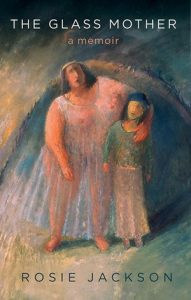Rosie Jackson offers workshops in poetry and memoir writing in the UK and world-wide, as well as individual mentoring. She is based in Frome, Somerset.
A prize-winning author, Rosie is widely published. Her seven books include The Glass Mother, The Light Box, Mothers Who Leave and What the Ground Holds.
Rosie is a Hawthornden Fellow 2017. She is a member of Arts and Health South West.
You have so many talents. Novels, poetry, short story. What do you enjoy creating most?
Since I finished my memoir two years ago, I’ve been focussing mostly on poetry. There are so many brilliant contemporary poets and there is always so much to learn. I have completed two unpublished novels and have published many short stories, but I now like the challenge of conveying story, character, narrative, place, through poems – it’s a different economy, a different form, reliant on metaphor, and where silences matter as much as words.
Your memoir, The Glass Mother was published recently (I love the title by the way). Do you think distance from time and place helps your writing and gives it a different edge?
Yes. I run memoir classes and I always tell students, don’t use writing as therapy – do the therapy first and the writing later. ‘Write in last year’s blood’. Otherwise you have an agenda that makes things go askew and you can’t have a balanced view. This is not to say the writing should not be vivid and emotionally intense. The aim is always to recreate experience in an arresting, colourful, careful way, which moves the heart, provokes thought, and allows the reader to identify with the character/narrator.
Many of your poems in The Light Box grew from your residency at Cheltenham Art Gallery. Did you know much about Stanley Spencer before you took the position and how did the residency affect your own creativity?
The residency was very short, but it stoked an already passionate interest in the English visionary artist Stanley Spencer – his art, life, marriages, and the work of his first wife Hilda Carline Spencer. Since the publication of The Light Box, the Spencer gallery in Cookham has asked me to run some poetry workshops there too, taking his poems as starting points, and I’m also now collaborating with another poet, Graham Burchell. We’re working on a whole book of poems about Spencer, which will read like a novel but also zoom in on some of the paintings. So that particular residency was a well-timed gift.
What is the main inspiration for your poetry? Is it an image? A thought? A sound?
Sometimes it’s an image: a painting, a surprising sight. But mostly it’s a feeling: trying to capture something evanescent, something that almost escapes language – a loss, a spiritual visitation, a sense of recognition, an experience of human love, perhaps some natural beauty that is hard to capture. Right now I’m trying to write a poem about Stanley Spencer in the war in Macedonia in 1918. He had malaria and in his feverish state he was reading poetry – Blake, Keats, but especially some English metaphysical poets like Richard Crashaw – and they gave him solace and an inner sense of being at home in literature. I like the contrast there of war and poetry and thinking about some of the other men in the army who were illiterate and never had access to that comfort of poetry. It’s a mixture of the spiritual, emotional, personal and political that inspires me.
Is there one particular tip or technique you would like to pass on to writers that has helped you with your own work?
I have 3 tips:
- Always read your work out loud, repeatedly, Whether prose or poetry, keep reading it out loud – to yourself, to others. This helps with the rhythm, and also catches things that are too melodramatic or overwritten. I would always say UNDERwrite, don’t overwrite, cut back almost completely on adverbs and indeed on most adjectives. Make the nouns and verbs do the work. This keeps your writing strong, powerful, lean.
- Read a lot. Too many writers want to write but don’t want to read. A good writer is also a good reader.
- And of course invest in Superglue to stick your bum to the chair. The secret of writing is time, discipline, putting it first, refusing to be distracted. And not reacting to rejections. One motto I like: ’Seven times down, eight times up.’

The Glass Mother is available from www.bookdepository.com or www.wordery.com
and as an eBook on Amazon Kindle
You can find more about Rosie, her books and her workshops at www.rosiejackson.org.uk
You will also find a link on the site to hear Rosie read some of her wonderful poetry. A soothing escape from the busyness of the day.
